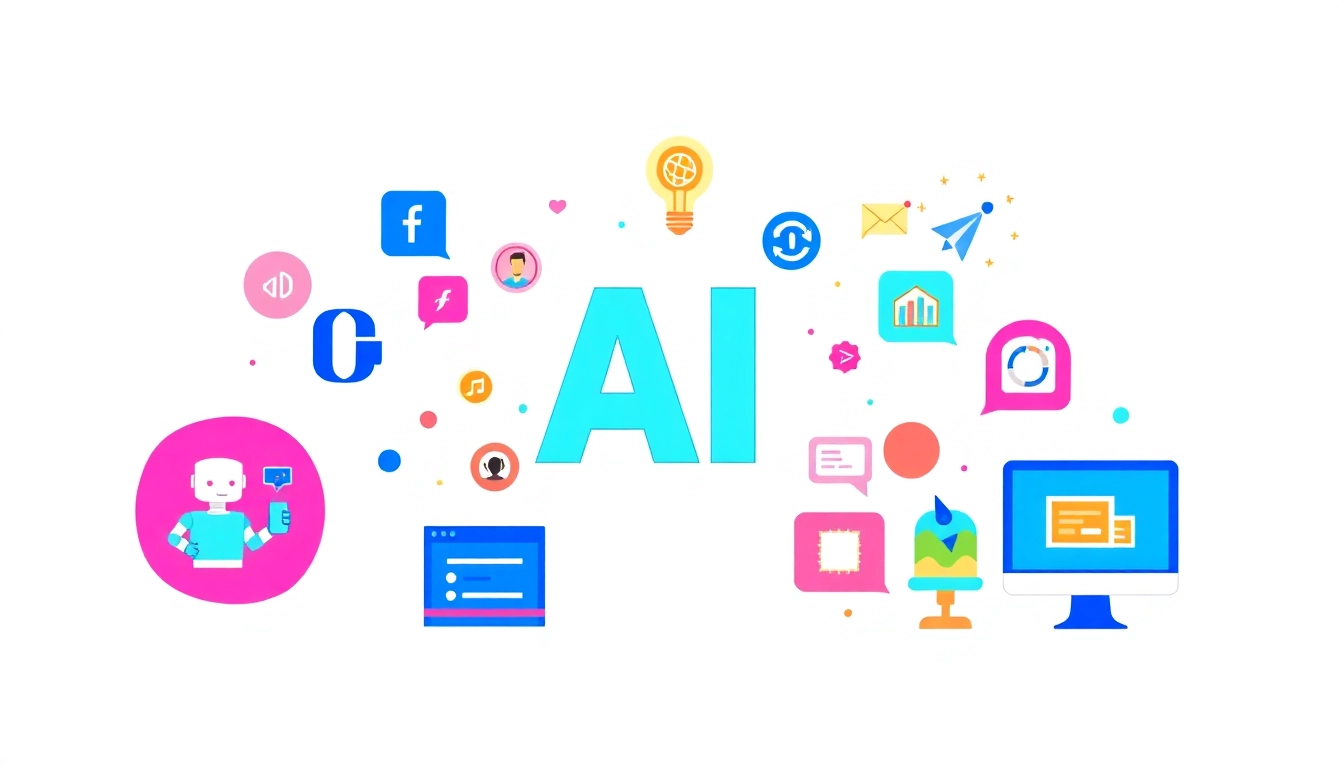Understanding AI Marketing Tools
In today’s digital landscape, the use of AI marketing tools has become essential for businesses aiming to streamline their marketing processes, optimize customer engagement, and drive sales. These sophisticated solutions leverage artificial intelligence to enhance various facets of marketing, ranging from content creation to data analysis. In this article, we will delve into the definition and functionality of AI marketing tools, explore their benefits, discuss their impact on efficiency, and highlight how they can revolutionize a company’s marketing strategy.
What Are AI Marketing Tools?
AI marketing tools encompass a variety of software applications designed to automate marketing tasks, provide analytics, enhance customer relations, and facilitate targeting through machine learning algorithms. They serve to analyze vast amounts of data and generate insights that help marketers make informed decisions. Typical functionalities include but are not limited to:
- Content Creation: Automated tools that generate written content, graphics, and even video.
- Customer Insights: Software that analyzes customer behavior and preferences to create personalized marketing campaigns.
- Predictive Analytics: Tools that forecast future marketing trends and consumer behavior based on historical data.
- Chatbots: Tools that employ natural language processing to engage with customers in real-time.
Benefits of Using AI in Marketing
The integration of AI in marketing strategies presents numerous advantages, including:
- Enhanced Targeting: AI algorithms analyze customer data to identify specific segments, allowing for targeted campaigns that resonate.
- Increased Efficiency: Automation of repetitive tasks frees up time for marketers to focus on creative strategy development.
- Data-Driven Decision Making: Real-time analytics provide actionable insights, facilitating better strategic choices.
- 24/7 Customer Engagement: Chatbots and automated responses enable businesses to interact with clients around the clock.
How AI Tools Improve Efficiency
AI tools transform marketing departments by automating mundane tasks such as data collection, analysis, and reporting. For instance, tools that analyze social media engagement can produce performance reports that save teams hours of work. Moreover, smart content generation tools can create personalized email campaigns, attracting higher engagement rates. This automation not only accelerates workflows but also enhances collaboration within teams, ensuring that members can concentrate on strategic initiatives rather than routine operations.
Top AI Marketing Tools for Different Needs
With an array of AI marketing tools available, choosing the right one for your specific needs can be challenging. Below are some of the top tools categorized by their primary functions.
Best Tools for Content Creation
Content is king in the marketing realm, and several AI tools help marketers produce high-quality content efficiently. Some renowned options include:
- Jasper: A powerful AI platform that generates content for various applications, including blog posts, social media updates, and promotional emails.
- Copy.ai: Perfect for creating marketing copy and product descriptions, Copy.ai uses NLP to generate human-like text that attracts customer attention.
- Surfer SEO: This tool assists marketers in optimizing their content for search engines by analyzing top-ranking pages and suggesting improvements.
AI Solutions for Social Media Management
Managing social media effectively can be time-consuming. AI tools excel in streamlining this process:
- Buffer: Allows users to schedule posts and analyze engagement, making it easier to maintain a consistent online presence.
- FeedHive: This tool helps marketers recycle content effectively, ensuring that popular posts are republished at optimal times for maximum reach.
- Hootsuite: Integrates multiple social channels and uses AI to suggest the best times to post and tailor content for specific platforms.
Analytics and Insights Tools
Data analytics is crucial for understanding customer behavior and marketing performance. Some of the best tools include:
- Google Analytics: While not exclusively an AI tool, its advanced features leverage machine learning to deliver intelligent insights on website performance.
- Kissmetrics: Specialized in tracking user engagement and conversion funnels, it provides valuable insights into what drives purchases.
- Tableau: A powerful data visualization tool that brings AI capabilities to data analytics, helping you understand complex data with simplicity.
Implementing AI Tools in Your Marketing Strategy
Integrating AI marketing tools into your existing strategy requires careful planning and execution. Here are key steps and considerations to ensure successful implementation.
Steps to Integrate AI Marketing Tools
- Define Goals: Clearly outline the objectives you want to achieve with AI tools, whether increasing engagement, sales, or improving customer service.
- Research Tools: Evaluate various AI marketing tools based on their features, ease of use, pricing, and customer support.
- Train Your Team: Organize training sessions for your marketing team, ensuring they understand how to use the tools effectively.
- Start Small: Implement one or two tools initially before scaling to avoid overwhelming the team and to assess performance accurately.
- Monitor Performance: Regularly review the effectiveness of the tools and tweak your strategy as necessary based on analytics.
Common Challenges and Solutions
While AI can drastically enhance marketing strategies, integrating these tools is not without challenges:
- Data Privacy Concerns: Ensure that all AI tools used comply with data protection regulations like GDPR. Regularly audit the processes for handling customer information.
- Resistance to Change: Employees may be hesitant to adopt new technologies. Offer ongoing support and showcase the benefits to encourage buy-in.
- Over-Reliance on Technology: While AI can boost efficiency, it should complement human efforts rather than completely replace them. Maintain a balance between automation and personal touch.
Measuring Success with AI Tools
To determine the ROI of AI tools, set key performance indicators (KPIs) aligned with your marketing goals. Useful metrics include:
- Engagement Rates: Analyze how well your audience is interacting with your content across different platforms.
- Conversion Rates: Track the percentage of users who take desired actions (e.g., purchases, subscriptions) as a result of AI-enhanced campaigns.
- Customer Retention Rates: Assess how well your AI strategies help retain customers through personalized engagement and support.
Future Trends in AI Marketing
As technology evolves, the landscape of AI marketing is set to undergo further transformations. Staying ahead of these trends will be crucial for marketers.
Emerging Technologies in Marketing AI
Some of the cutting-edge technologies that are emerging include:
- Natural Language Processing: Continued advances in NLP will enable more sophisticated chatbots and content generation tools.
- AI-Powered Personalization: Technologies that personalize user experiences based on individual preferences will become more prevalent, resulting in hyper-targeted marketing.
- Voice Search Optimization: With the rise of voice-activated devices, optimizing content for voice search will grow in importance.
The Role of Machine Learning
Machine learning (ML) continues to be at the heart of AI marketing tools. Its capacity to learn from data inputs and improve automatically will pave the way for:
- Advanced Predictive Analytics: Predictive tools will become even more accurate, giving marketers deeper insights into customer behavior patterns.
- Customizable AI Solutions: Businesses will increasingly demand tailored AI solutions that align with their unique strategies and objectives.
Predictions for the Next Five Years
Looking ahead, AI marketing tools are likely to evolve significantly:
- Greater Integration: CRM systems will integrate seamlessly with AI tools, providing a cohesive experience for sales and marketing teams.
- Focus on Data Ethics: As data privacy becomes more important, the use of AI in marketing will emphasize ethical considerations, guiding how data is collected and used.
- Increased Competition: As AI tools become more accessible, competition will intensify, driving innovations and improvements in existing tools.
Case Studies and Success Stories
Real-world examples can illustrate the profound impact AI marketing tools have had on businesses across various industries.
How Companies are Winning with AI Tools
Companies leveraging AI marketing tools have reported impressive results:
- Netflix: By using sophisticated algorithms to analyze viewing habits, Netflix creates personalized recommendations for its users, significantly increasing engagement.
- Amazon: Through predictive analytics, Amazon anticipates customer needs, enabling it to enhance user experiences and increase sales.
- Sephora: The beauty retail giant uses AI-driven chatbots to guide customers online, resulting in improved customer service and reduced reliance on human staff.
Lessons Learned from Implementation
From these success stories, several lessons emerge:
- Start with Data: Gathering and analyzing data is critical for developing effective AI strategies.
- Be Customer-Focused: Tools must be designed with the end-user in mind to drive effective engagement and interaction.
- Continuous Adaptation: The marketing landscape changes rapidly, and strategies must be adaptable to remain effective.
Future Prospects and Recommendations
As AI marketing tools continue evolving, businesses should:
- Invest in Training: Ongoing education for marketing teams on how to leverage AI tools effectively will be crucial.
- Experiment and Iterate: Companies should experiment with different tools and approaches, continuously iterating based on results and learning.
- Stay Informed: Keeping updated on emerging technologies and trends will enable businesses to remain competitive in the market.



